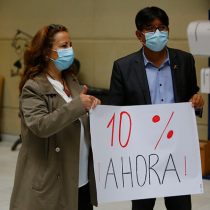
In government and officialism, a deployment was rapidly activated to generate such consensus in political actors that it succeeds in neutralizing the approval of the third withdrawal of 10% of planned funds, as some opposition parliamentarians are pushing.
On the one hand, the Minister of Finance, Rodrigo Cerda announced today that in “the coming days” there will be announcements with new measures to deal with the economic effects of the pandemic. “Surely they will continue to see government measures to support families in the coming days, because we recognize that the pandemic is not over and we need to continue to support families,” Cerda said, according to Emol.
“We’ve already announced the extent of Emergency Family Income (for March and April) and we’re probably going to announce other things in the coming days,” he stressed. “At least in the first part of the year there are many compatriots who are still complicated, which means we have to continue to support,” Cerda emphasized.
In the mission of going out to anticipate the government’s plans, the Minister of the Segpres also participated, Juan José Ossa “Our conviction is to continue to deepen direct transfers that also have the virtue of being at tax cost and subsidizing employment,” he said on Radio Infinita. “We have to make direct transfers to the most vulnerable, which does not mean that those who may have funds for a third withdrawal cannot qualify in certain circumstances for that group. (…) we all know that the third withdrawal is a regressive policy, that three million people have already exhausted their pension funds. We all know it’s an unconstitutional way to legislate then why don’t we push public policies that are going to reach people?” he added and acknowledged that a new bonus is going to be announced, probably over the weekend.
By the way, the idea of new aid to people in crisis by the pandemic is of interest to the sector’s presidencies. One of the proposals is that of Joaquín Lavín, who proposes to use part of the Solidarity Fund associated with Cesantía Insurance. “If you make me choose between continuing to make money out of retirements in circumstances where we want to make a planned reform to put money on retirements, or take money out of this other fund where there’s $12 billion (…) I pull from this other bottom, ” said Lavín.
The proposal of the mayor of Las Condes was landed on a document that the candidate’s team brought to the government. “There is an Individual Fund and a Solidarity Fund. A total of US$12 billion is now accumulated in these funds, which do not consider an additional US$2 billion agreed into this year’s Budget Act to be incorporated into the Solidarity Fund,” the proposal says. “We are then talking about very relevant amounts that are covered by those accounts, and which were rightly contemplated for use in times of economic hardship and cessanty. Of these $12 billion, $8.5 billion are in people’s accounts and $3.5 billion in the Solidarity Fund,” says the document that was received at least cautiously from the government.
“We believe that such initiatives can be analyzed, but that pension funds are to finance those pensions and the cesantía funds are for when there is such an extension,” said government spokesman Jaime Bellolio.
Lavín’s idea was supported by the also UDI candidate, Evelyn Matthei. “In these conditions where all of Chile is suffering, everyone is actually suffering, those funds can be used perfectly and would be a tremendous relief for all families. It’s a way I understand I was being evaluated by the government and I think it’s by far the best formula,” Matthei said.
The one with another idea is the RN presidency, Mario Desbordes, who did not support Lavín’s initiative, because they are resources that come from “people’s pockets”. But in return Desbordes proposed an unseeded bonus to 70% of the population.
“We can’t offer a bonus that doesn’t finally receive many people because 40, 50, 60, 70 requirements are requested. And I find myself and the parliamentarians have told me the same thing, at the fair, on the streets, when you approach people on the street, ‘I didn’t get it because I have a pension of $180 thousand, I didn’t get it because I didn’t meet this requirement, I didn’t get it because the file wasn’t up to date , they didn’t give it to me’ and so the ‘a mI didn’t give it to me’ ends up being so many people, that I ask my government to please (…) to 70% of the population, a bonus,” Desbordes asked.
However, Ms. Alejandra Sepúlveda of Regionalist Banking, one of the drivers of the third withdrawal, taking these proposals into account said that “the incorporation of a middle-class bond is a story we already know and just ad portas from the discussion of the third withdrawal we know what its intention is. However, while one sees with good eyes that a bonus can be incorporated into the middle class, the experience we have in terms of focus, use, the possibility of applying for this bonus with all the requirements, the requirements, the complications to obtain it make us doubt its true coverage,” he said.





